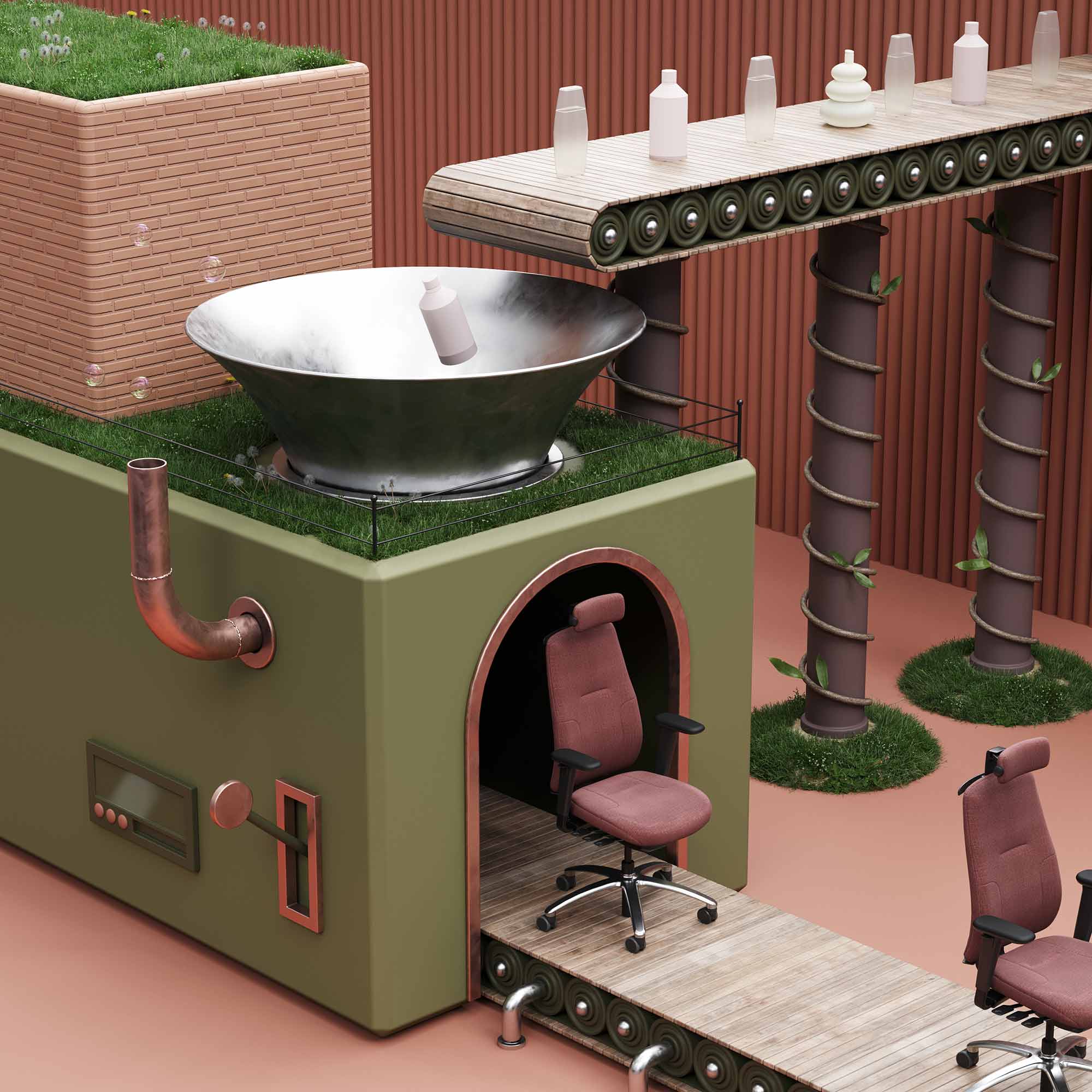
Flokk's 2030 goals are a long-term commitment to sustainability
We share our ambitious 2030 sustainability goals on climate, materials, and energy.
- Sustainability
- Flokk News

At Flokk, we are continually raising the bar when it comes to our environmental ambitions. We have created a range of sustainability goals, with the aim of drastically reducing our carbon footprint and using even more sustainable resources.
In 2011 Flokk published its first sustainability report in GRI Format (Global Reporting Initiative), a thorough examination of every aspect of the company, creating the clearest picture to date of our overall impact on the environment. Since then we have set ambitious long term targets with three focus areas; reducing our impact on the climate, using fewer resources, and removing harmful chemicals which can affect people’s health.
Last year the deadline for our first long term targets passed – our 2020 goals – and we lifted the bar even higher for our 2030 goals.
So how did we do, and what are our 2030 goals? Exploring two of the three key areas, we lift the lid on our performance.
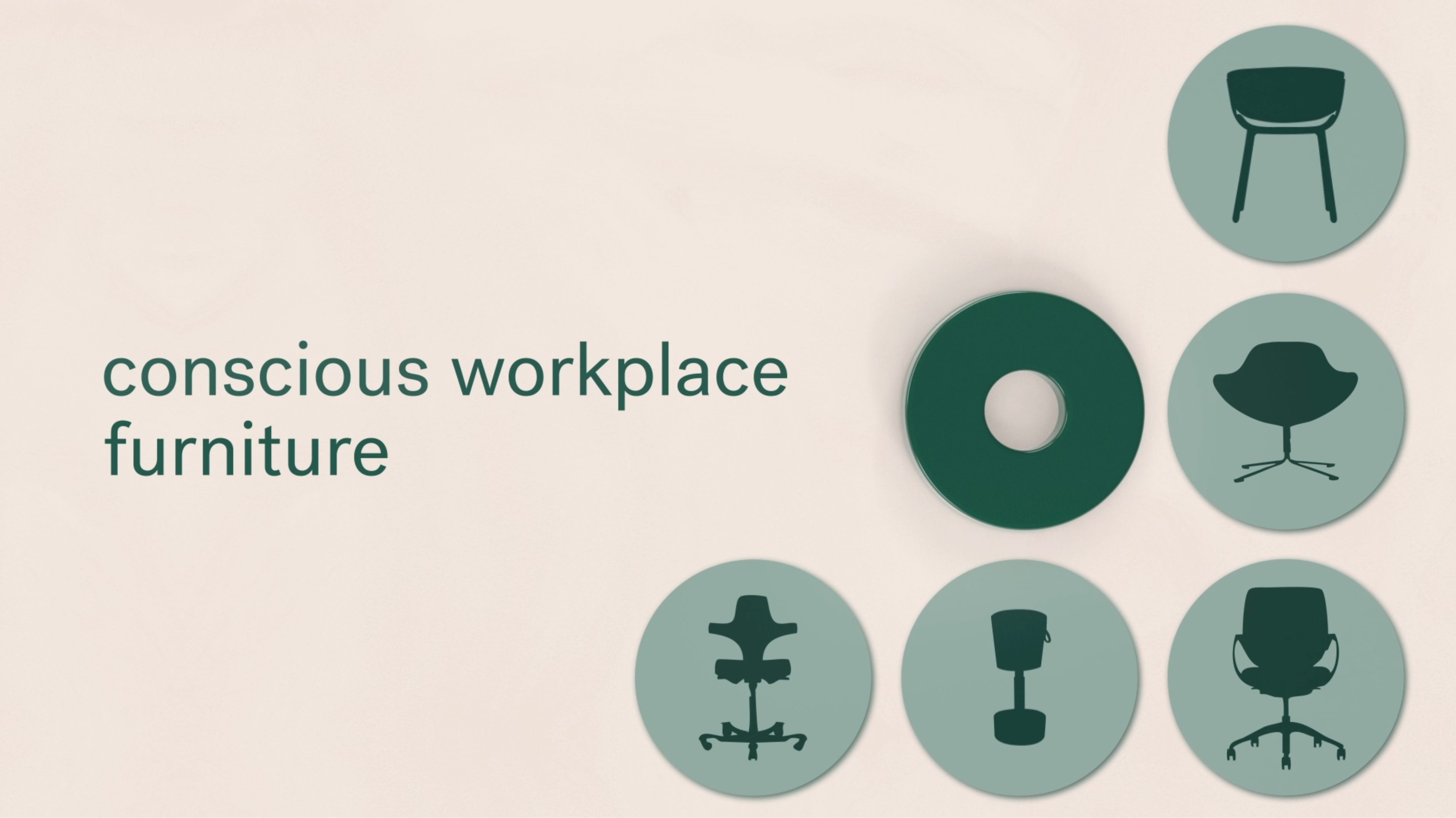
Energy & Climate
An important aspect of our climate goals revolves around the use of energy, and the carbon footprint of our products, properties and people. This means reducing the amount of energy we consume and finding renewable sources for the energy and electricity we can’t live without. In 2011, the targets we set aimed at reducing the energy consumed per product made, sourcing 100% renewable electricity for all our facilities, as well as eliminating the use of fossil fuels for heating.
By introducing a range of energy-efficient measures at our main production facilities and sourcing renewable electricity for our factories, showrooms and offices, we were able to surpass our 2020 target by 2018.
2020-2025 Energy Goals
- 20% reduction in energy consumed per product made by 2020 | Result - 25% reduction since 2010
- 100% renewable electricity by 2025 | Result – 94% renewable electricity
- 0% Fossil Fuels for heating by 2025 | Result – 52% renewable energy
Our new goals for 2030 push for even greater efficiency and use of renewables. As carbon emission is the key indicator of climate impact, this is something we track across our entire company in our reporting.
Key 2030 Energy Goals
- 55% reduction in CO2e per product made vs 2015 levels
- 40% reduction in energy consumed per product made vs 2015 levels
- 100% renewable electricity in all Flokk locations
- 0% fossil fuels for heating by 2025
We hope to achieve these goals through a range of measures, including switching our car fleet to zero/low emissions vehicles, reducing our employee's air travel, purchasing renewable electricity at all of our sites, continue energy efficiency gains at all sites and switching fossil fuels with renewable sources, such as heat pumps which run on green electricity. Our research and development team are also always at work creating more efficient ways to manufacture our products using less energy-intensive methods.
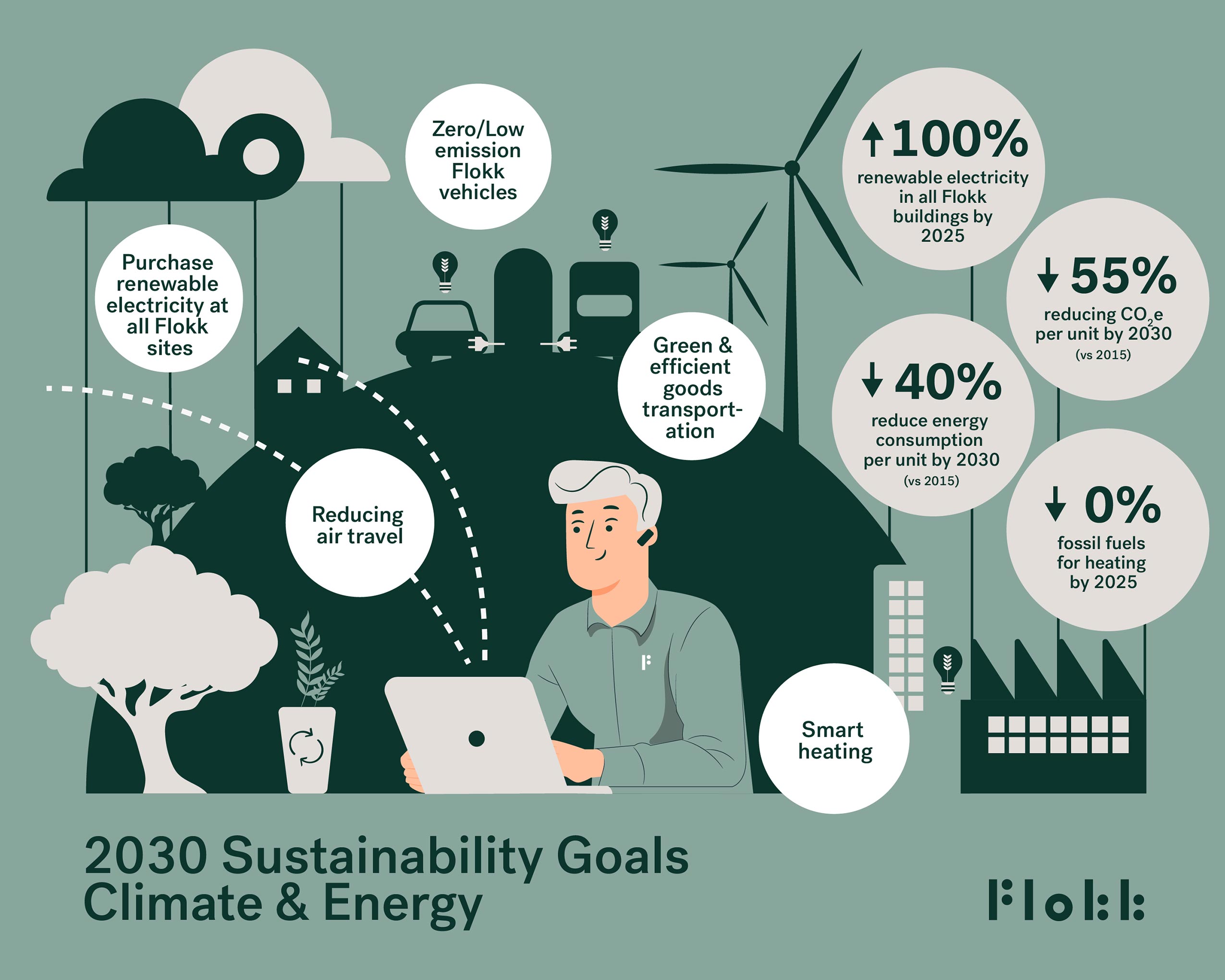
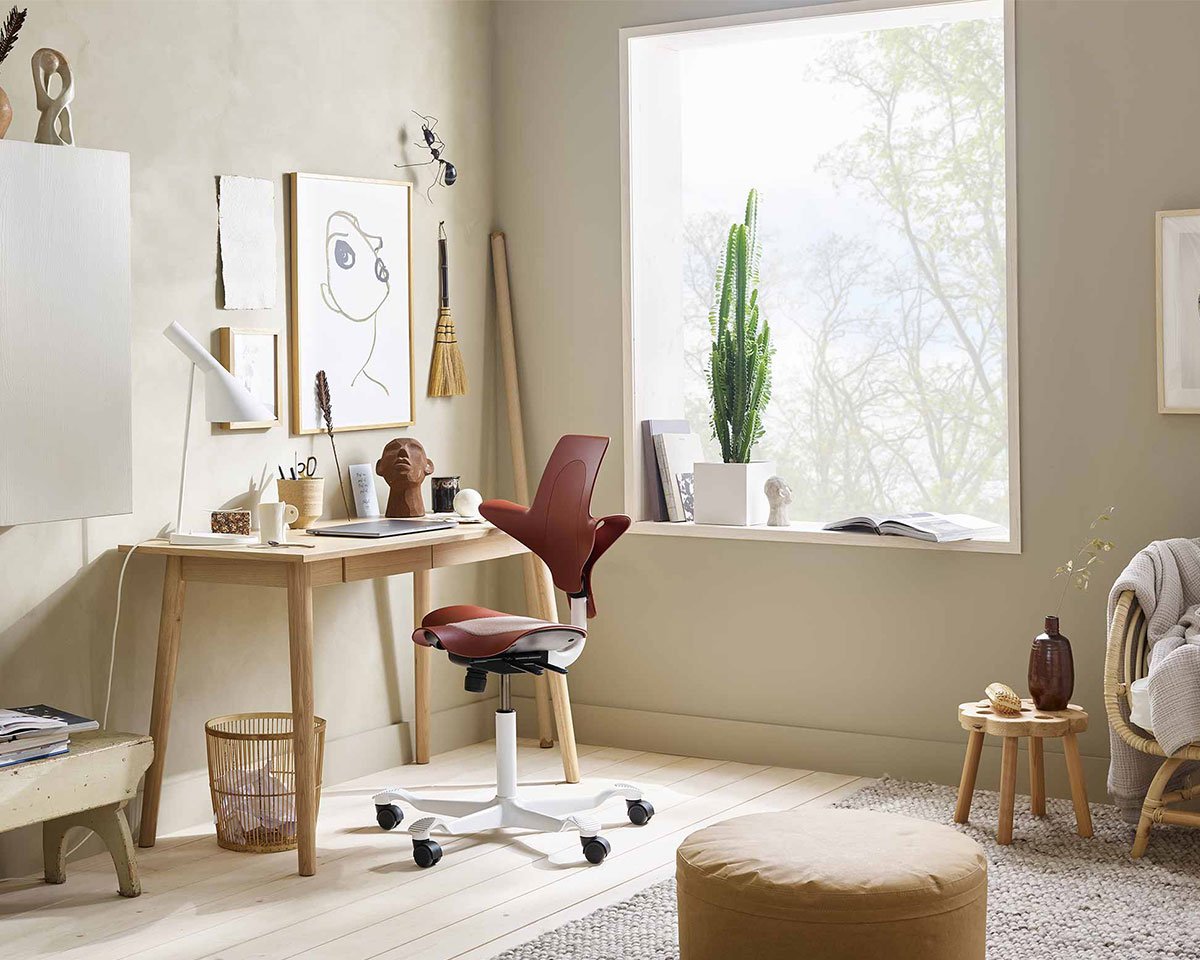
Recent research with SINTEF into utilising new material sources led to the release of a limited edition chair made from coloured recycled snowplough markers. This research contributed to the development of future products using coloured recycled plastics.
Materials & Climate
The materials we use has by far the greatest impact on our overall emissions and carbon footprint. In fact, 90% of our emissions come from our products, with 95% of those down to the materials. Therefore, our most important sustainability goals revolve around the materials we use, with a strong emphasis on using more and more recycled materials.
Since 1995 we have been using recycled plastics, and this share of recycled materials has grown ever since.
In 2011 we set ourselves the goal of achieving 60% recycled materials in our products, with additional targets based on ever-increasing volumes of recycled materials, as well as ensuring our designs are recycled at the end of life. By 2020, we had made significant strides towards our goals on a range of designs.
2020 Materials Goals
- 60% recycled materials in our products | Result – 3 chairs passed 60% with many more 50-60%
- 1000 tonnes of recycled plastic used by 2021 | Results – 649t in 2019, 800t in 2020
- 90% of chair components recycled or recovered after use | Results - not yet able to track actual recycle rate of our chairs
Using recycled plastics not only stops waste from filling up landfills or polluting the environment, but it also takes less energy to turn waste into a usable resource. The 649 tonnes of recycled plastic we used in 2019 equates to 843 tonnes of CO2e saved when compared to using virgin plastics. And whilst our ambitious target of 60% recycled materials in all our products has not yet been met, we have proved it is possible with our latest designs, and as our development team continue to work on new ways of introducing recycled materials into older designs, we are confident we can beat that target in the near future.
Our goals for 2030 build upon our previous goals, increasing our targets for recycled materials, setting figures for our key materials as well as looking at the packaging we use and how we deal with our own waste.
Key 2030 Materials Goals
- Increase our share of recycled materials used in our products to an average of 60%
- 1500 tonnes of recycled plastics used annually by 2025
- Increase our share of recycled metals: 95% in aluminium, 50% in steel
- 100% recycled plastics in all our packaging
- 100% FSC certified wood in all our wooden components
- 85% of our waste generated will be material recycled by 2025
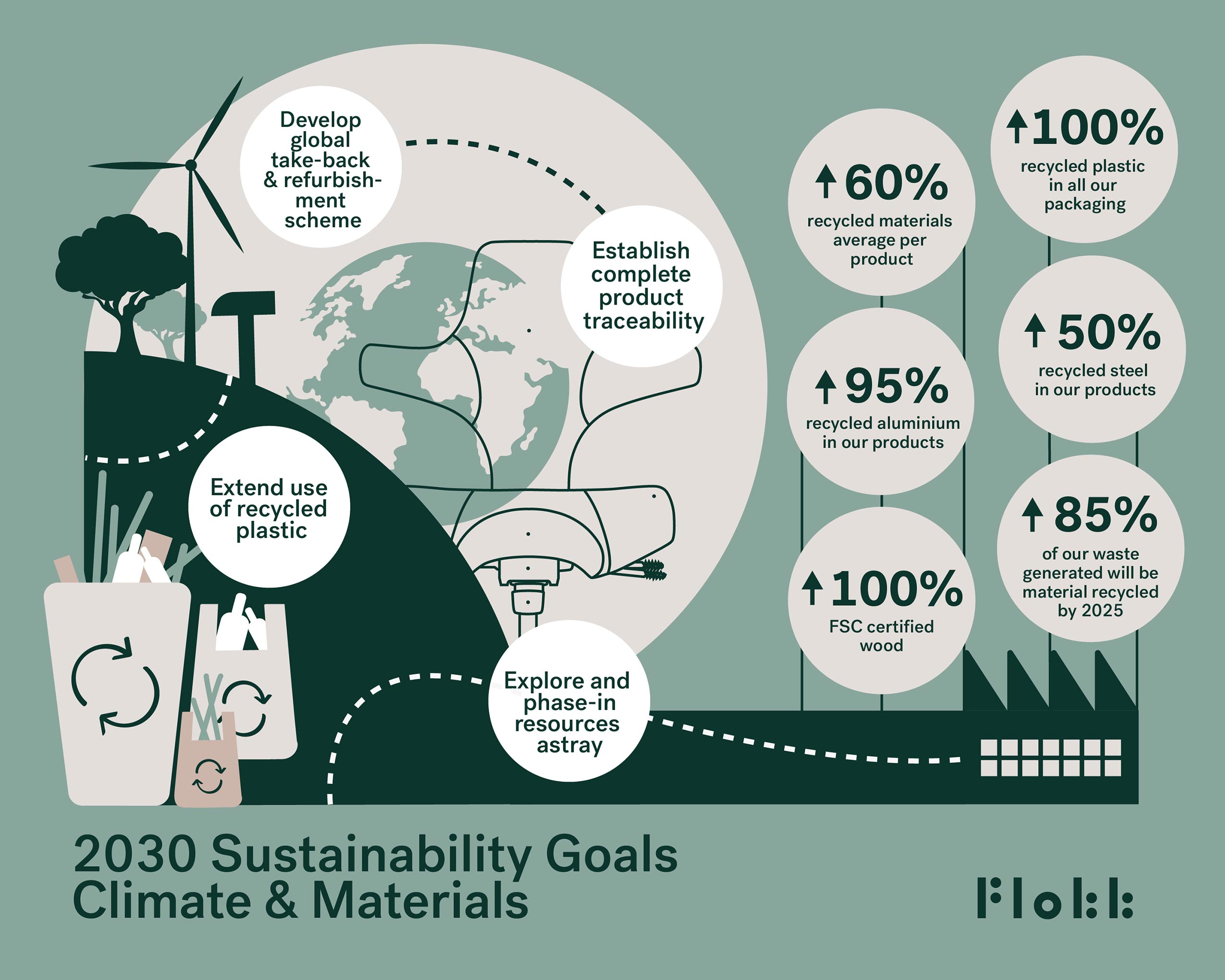
Global Ambitions
The targets we set ourselves are not arbitrary figures, they are defined to ensure we contribute to the achievement of the global targets as set by the EU European Green Deal, UN Sustainable Development Group and the UN Convention on Climate Change to name a few. In fact, the goals we aim for not only to meet but to exceed the levels and expectations which the situation requires, in an effort to inspire others to reach further in their own efforts.
They also reflect our learnings and experiences from working on our historical sustainability goals. We see the ongoing crises of climate change, biodiversity, plastic waste and over-consumption as opportunities to make a difference.
Speaking about the challenge ahead, Flokk SVP Christian Lodgaard says “Five years on from the signing of the Paris agreement in 2016, global climate emissions are not on the needed path and tackling climate change has become only more urgent. However, we are convinced that this can be navigated if businesses, consumers & governments pull together. Our contribution is to set firm targets that meet & exceed those set by leading international bodies. And then to stick our necks out by sharing them, hoping to be held accountable & to inspire others to do the same.”
For further information, including inspiration on setting your own sustainability goals, you can download our latest sustainability report here.
This might also interest you
HÅG SoFi – now available in tumbled aluminium
Extending the beauty of tumbled aluminium to HÅG SoFi — versatile,...
HÅG Tion mesh – now available
Flokk is proud to introduce a new addition to the HÅG Tion family - HÅG...
OFFECCT Circulus wins Red Dot: Best of the Best Design Award 2025
Offecct Circulus, designed by Mario Ferrarini, has been awarded the...